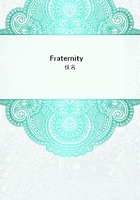
第46章
In her studio that afternoon Blanca stood before her picture of the little model--the figure with parted pale-red lips and haunting, pale-blue eyes, gazing out of shadow into lamplight.
She was frowning, as though resentful of a piece of work which had the power to kill her other pictures. What force had moved her to paint like that? What had she felt while the girl was standing before her, still as some pale flower placed in a cup of water? Not love--there was no love in the presentment of that twilight figure;not hate--there was no hate in the painting of her dim appeal. Yet in the picture of this shadow girl, between the gloom and glimmer, was visible a spirit, driving the artist on to create that which had the power to haunt the mind.
Blanca turned away and went up to a portrait of her husband, painted ten years before. She looked from one picture to the other, with eyes as hard and stabbing as the points of daggers.
In the more poignant relationships of human life there is a point beyond which men and women do not quite truthfully analyse their feelings--they feel too much. It was Blanca's fortune, too, to be endowed to excess with that quality which, of all others, most obscures the real significance of human issues. Her pride had kept her back from Hilary, till she had felt herself a failure. Her pride had so revolted at that failure that she had led the way to utter estrangement. Her pride had forced her to the attitude of one who says "Live your own life; I should be ashamed to let you see that Icare what happens between us." Her pride had concealed from her the fact that beneath her veil of mocking liberality there was an essential woman tenacious of her dues, avid of affection and esteem.
Her pride prevented the world from guessing that there was anything amiss. Her pride even prevented Hilary from really knowing what had spoiled his married life--this ungovernable itch to be appreciated, governed by ungovernable pride. Hundreds of times he had been baffled by the hedge round that disharmonic nature. With each failure something had shrivelled in him, till the very roots of his affection had dried up. She had worn out a man who, to judge from his actions and appearance, was naturally long-suffering to a fault.
Beneath all manner of kindness and consideration for each other--for their good taste, at all events, had never given way--this tragedy of a woman, who wanted to be loved, slowly killing the power of loving her in the man, had gone on year after year. It had ceased to be tragedy, as far as Hilary was concerned; the nerve of his love for her was quite dead, slowly frozen out of him. It was still active tragedy with Bianca, the nerve of whose jealous desire for his appreciation was not dead. Her instinct, too, ironically informed her that, had he been a man with some brutality, a man who had set himself to ride and master her, instead of one too delicate, he might have trampled down the hedge. This gave her a secret grudge against him, a feeling that it was not she who was to blame.
Pride was Bianca's fate, her flavour, and her charm. Like a shadowy hill-side behind glamorous bars of waning sunlight, she was enveloped in smiling pride--mysterious; one thinks, even to herself. This pride of hers took part even in her many generous impulses, kind actions which she did rather secretly and scoffed at herself for doing. She scoffed at herself continually, even for putting on dresses of colours which Hilary was fond of. She would not admit her longing to attract him.
Standing between those two pictures, pressing her mahl-stick against her bosom, she suggested somewhat the image of an Italian saint forcing the dagger of martyrdom into her heart.
That other person, who had once brought the thought of Italy into Cecilia's mind--the man Hughs--had been for the last eight hours or so walking the streets, placing in a cart the refuses of Life; nor had he at all suggested the aspect of one tortured by the passions of love and hate: For the first two hours he had led the horse without expression of any sort on his dark face, his neat soldier's figure garbed in the costume which had made "Westminister" describe him as a "dreadful foreign-lookin' man." Now and then he had spoken to the horse; save for those speeches, of no great importance, he had been silent. For the next two hours, following the cart, he had used a shovel, and still his square, short face, with little black moustache and still blacker eyes, had given no sign of conflict in his breast.
So he had passed the day. Apart from the fact, indeed, that men of any kind are not too given to expose private passions to public gaze, the circumstances of a life devoted from the age of twenty onwards to the service of his country, first as a soldier, now in the more defensive part of Vestry scavenger, had given him a kind of gravity.
Life had cloaked him with passivity--the normal look of men whose bread and cheese depends on their not caring much for anything. Had Hughs allowed his inclinations play, or sought to express himself, he could hardly have been a private soldier; still less, on his retirement from that office with an honourable wound, would he have been selected out of many others as a Vestry scavenger. For such an occupation as the lifting from the streets of the refuses of Life--a calling greatly sought after, and, indeed, one of the few open to a man who had served his country--charm of manner, individuality, or the engaging quality of self-expression, were perhaps out of place.